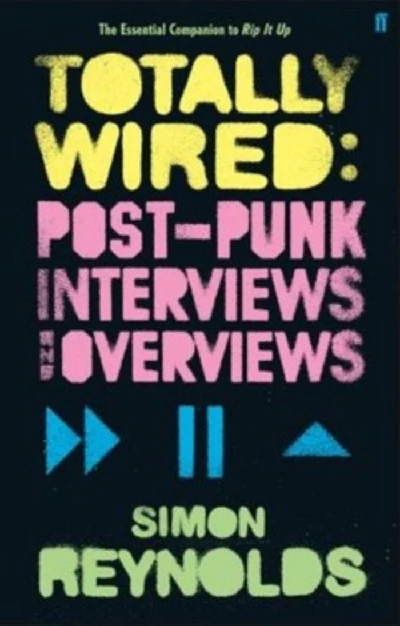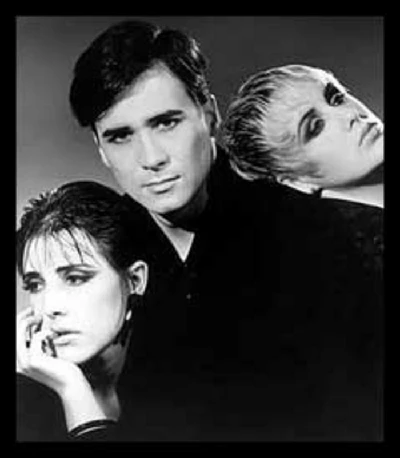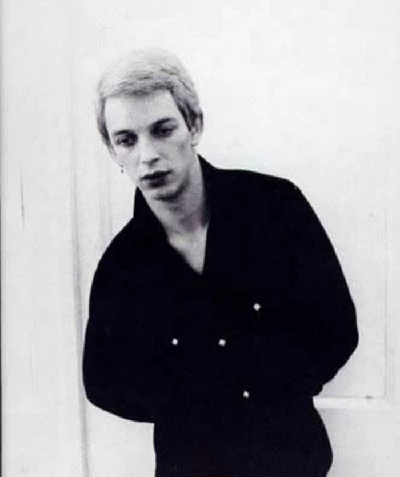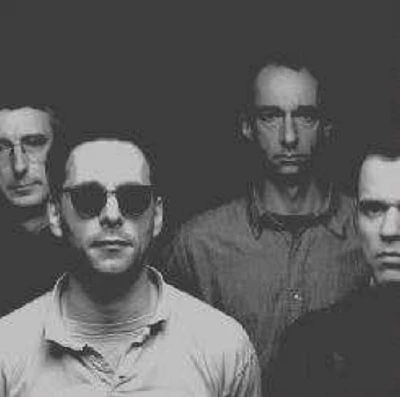published: 19 /
4 /
2009

while in the second part he talks about the changes in music journalism over recent years
Article
PB : There are certain musical styles that have inspired you to delve into them further. What is it about a style of music that drives you to get under its skin ?
SR : It always starts with the sound – I think that’s the difference between what I do and what music journalism does generally, and academia. Academia, strictly speaking, it might well be that an academic might be drawn to something because they like the music, but strictly speaking, that’s actually irrelevant to what they do. They’re supposed to avoid talking about their own attraction or repulsion to a sound, and I’m sure there are examples of academics who have examined subcultures when they haven’t liked the sound, or had any strong feelings about it, just because they found it interesting on other levels.
I don’t think I ever write about anything with any intensity that either I really like it, or I find it really interesting. Generally it’s something I really, really like, or I might be moved by dislike to write about it. There has to be a strong feeling about the sound first to motivate me to explore it.
I would try to avoid writing about things that have a sense of loyalty that was based on something other than sound. For instance, with dance music I’ve been quite a lot less supportive of dance music in this decade. I’ve been quite critical of it. An obvious thing for me to do, given that I’d done that book, 'Energy Flash', would be to just carry on specialising in dance music and being like a booster for it. But at a certain point, a lot of it wasn’t matching up to the levels of excitement that I felt about the previous stuff. So while I would carry on writing about it, I would write about it quite critically.
So I never do the boostering thing – I try to avoid being one of those people who sets up home in a genre of music and sticks with it, and kind of is always trying to boost it. I think it’s quite important sometimes to say actually, everything’s turned to crap, let's be honest. I think that’s what happened with jungle - drum ‘n’ bass. At a certain point, it kind of got a bit crap, and there are two ways you can respond to that. One is to stick with it very loyally and hope it regenerates or that you can find little things within it that you can endorse. But for me, in some ways the truer response is to say this has turned to crap. Let's move on to something else, which is what a lot of people did. They moved onto the UK garage thing.
Some people think that’s trend hopping. I don’t think it’s trend hopping, I think it’s just how consumers are really. I’ve never been a big one for blindly sticking with movements.
It’s like grime, some people got annoyed with me when I said I’d lost interest in grime, but I followed it for about four or five years, and then it just seemed to lose it, as far I’m concerned, so I just stopped writing about it.
PB : That probably comes down to the way that once a musical style becomes more widely recognised, it becomes associated with certain elements – to be that style, they all have to have those elements. Then it gets stale.
SR : Yes, at a certain point, it becomes a known quantity. It’s quite unusual for a genre to be able to stay evolving for a very long time; I can’t think of many examples. Hip Hop is one of the most successful, and Jamaican music, from ska to reggae to dancehall has managed to keep changing, while still being the same thing. That’s quite a neat trick for a style of music to do I think.
PB : What is it about those genres that you think allows them to evolve in that way ?
SR : Recently I’ve found most hip hop to be depressingly uniform. I think it had a really good run, if you take it from the early eighties to the early noughties, that’s a really remarkable run for a music keep evolving so much. I daresay that there probably are still cool things going on in various corners of hip hop.
It’s just most of the stuff that I see on the urban music channel in America is desperately uninspired, whereas there was a time earlier in the decade where you’d put on the TV and watch one of the black video shows, like the black 'MTV', which is called 'BET', and it would be mind-blowing. And the videos would be really creative as well. What’s so depressing about hip-hop now is that the videos are so self-parodic and ridiculous.
There’s something about black music cultures generally where, it’s something about the conditions of intense hyper-competitiveness, there’s so much talent and so many people competing, and it’s quite sort of cruel. you could do the most amazing record and then it might just be one sublime soul song, or one rap record and you can be discarded, because there’s always new talent coming along.
You get the same thing in rock, but you also get people in rock who manage to eke out a pretty decent career for a long time, but the cycles of turnover in black music is quite sort of harsh, I think in some ways, but something about that competitiveness keeps it fresh.
Also I think that hip hop and things like reggae are less mediated. There are hip hop magazines, but I don’t think they’re nearly as important in shaping the consciousness of the fans and musicians as the rock press is in America and the UK.
I’m sure rappers and producers read these magazines, but they don’t seem to some how, it doesn’t have any driving power in terms of shaping the music. I think A magazine like 'The Source' doesn’t have anything like the role the 'NME' had when it was arbiting rock culture and the direction of the music.
So in a funny sort of way, a relative scarcity of mediation around black music helps it to sort of…I don’t want to say it’s like they’re somehow operating in a state of innocence, but they’re less self-conscious, I think.
I think a lot of, especially British, indie rock and rock culture is very very cripplingly self-conscious and thought out. That can be good in some circumstances, it can lead to very interesting combinations of ideas and presentation and artiness, but it can also lead to just really… it somehow dampens the engine of the music, I think.
PB : The environment in which music journalists operate has changed a lot over the last few years, with the rising popularity of the internet and the broadening of media to include so much. What effect do you think that’s had on music and music writing in general ?
SR : Mainly I think it’s that there’s so much stuff, I can’t keep up with all the writing about music. It’s the number of magazines, the number of web sort of magazines and things that are somewhere between a fanzine and something professional. Then there’s all the blogs, some of which are of a very high standard, or very interesting, charismatically written stuff. There’s just so much more opinion that you can access, it’s quite confusing, I find.
It’s quite hard to keep up with, because there’s just not enough time in the day. It’s hard to have any take on global music writing because the things I read tend to be publications that I work for, I read 'The Wire' and 'The Word', because I contribute to both and I enjoy both. They couldn’t really be different as magazines, but they both have really good stuff in them.
I look at 'Uncut', because I have contributed to them, and I get their newsletter. I read the newspapers, and the newspapers cover pop music really intensively, in a way that they never really did when I was growing up. Each paper had like one pop critic, who’d maybe do one review a week, and they were often older guys who were a little bit out of touch, or had, sort of odd tastes. Sometimes in a good way – there was one guy who was just like the world’s biggest Japan fan, long before Japan were and he would write persistently about Japan very supportively, for 'The Guardian', I think it was, maybe it was for 'The Times'.
But now, you look at a paper like 'The Guardian' and it’s got almost blanket coverage of pop music. There’s always opinion and blogs, stuff that’s in depth and funny lists. It’s really like, if you combine 'The Guardian' and 'The Observer Music Monthly', it’s like a music paper in its own right – it probably is one of the best read music papers in the world. It’s almost too much – if I was to try to read all the stuff everyday, I wouldn’t get any work done.
I come across things that are amazing, but they tend to be more from the bloggers. Every so often I’ll come across a fantastic piece that’s brilliantly written and something that probably wouldn’t have had the space in the past as really been enabled by the web, because you can have things of unlimited length. You might have come across it in a fanzine, but then the chances of you coming across it is so much less likely in a fanzine.
Comparing when I started to now, the average quality of writing is slightly higher, but there’s so much that things don’t stick out from that huge plan of pretty good-ness. The same goes on with music – there’s so much music that it’s quite hard for thing to stick out as landmarks. I think it relates to this general problem with our culture that there’s just too much of everything - it’s a problem of abundance, I think.
Too much music, too much archiving of the past – it’s just overwhelming and I think that means that every little piece of that has less impact. I think because there is so much writing, music writers feel like they have less impact, so they don’t write the kind of pieces that only people who imagine that they have a huge impact will write – those sort of I-have-seen-the-future pieces, or manifesto like pieces which used to come from a time when there was only a handful of music papers. So if you were writing in the 'NME' and discovering a band or writing a think piece, you could have a kind of swagger, as you were being read by thousands and thousands of people, and it might actually had an impact on bands - you might have an impact, not only on bands being successful, but it might influence new bands that are forming, and influence their ideas of what music can be.
So it’s almost like a genre of music writing, what I call the messianic mode of music writing, has kind of become less possible, because no-one honestly feels like they can ever have that impact, because there’s so much music writing. The mode you get more now are these well thought out, well informed pieces. That’s the other thing – when I used to write, there was very little that you could refer to, factually – there was no Wikipedia or anything like that. So often the writing was less well informed because there is no information to inform yourself with.
When I read things on the web, they’re often very precise and well-informed, and people have really done their homework, which gives it a little bit of a nerdy vibe, if you know what I mean. You don’t get the grand statements, but you get sort of more accurate writing. I’m very much from the era I’m from. I’m very taken with grand oratory of rock writing, when it was trying to lay down the law, or not lay down the law, but make the grand statement, and you don’t get that.
But that’s probably also reflected in the music, which is so fragmented. You wouldn’t get that kind of writing anyway because I don’t think people believe in music in the same way, no-one’s as strongly invested in a single kind of music, we kind of pick and mix – check out a load of this, check out a bit of that.
PB : Another aspect of music today is that it seems to be penetrated by a sort of marketing mindset. What are your thoughts on that ?
SR : People are much more aware about how to build a career, find a niche audience, how to present themselves and market themselves, the bands know all this stuff. In some ways, I wish they didn’t know that kind of thing, that they were these wishy washy artists which is sort of slightly retrogressive.
I used to have a slightly romantic take that rock musicians would just be purely these mythic, random characters, who just crashed cars and went crazy, kind of like wishing things were like they were in the days of Marc Bolan and Led Zeppelin, where bands didn’t appear to know that much about money and investments or manipulating their careers.
That’s a slightly backwards view – in some ways, it’s good that musicians know how to manage their own careers, and actually make money out of it and not be exploited, but it does mean that they’re not quite as mystic in the way they operate.
Bands do almost seem to know that they’re brands. They know how to pitch themselves, position themselves as a brand. I think that marketing consciousness as a whole has just infiltrated all of our consciousness as a whole.
I really like the band Vampire Weekend, but they seem to be a bit savvy in the way that they’ve made their career happen and in some ways it’s quite good because they own their recordings, which is very sound - they can get the maximum exploitation of their own art, and I read somewhere that when they bought a tour van, they turned themselves into a limited company for some kind of technical tax reasons, or something. That’s quite savvy, but it’s also not very romantic at the same time.
PB : When you put it like that, I suppose it is a shame that the mysticism of rock doesn’t really exist any more.
SR -I think in some ways, some of the appeal of Pete Doherty and Amy Winehouse is that they seem to be flashbacks to an era when rock stars were a bit more romantic and out of control and just purely about their art and about living, living very well. Although even Pete Doherty kind of used his own debauchery as part his sales campaign, like when he was in prison he had some kind of website he was operating from prison or something. For the promotional campaign for the last Libertines album they used his drugginess as part of the way the record was sold. It’s quite interestin, even that kind of became a brand, the fact that he was so out of it and seemingly out of control.
PB : Arguments have been made about the control that advertisers have over the editorial content of publications, because they now have to work harder to get the advertising revenue in, due to the levels of competition. How do you feel about that ?
SR : One of the things about the music press when I read it and even to an extent when I was writing for it was that there were so fewer places that record companies and tour promoters could advertise. They couldn’t get the information out any other way, so they’d have to advertise.
That gave the papers a greater feeling of entitlement, I guess. They had all these guaranteed advertising pages, so that allowed them to have a lot of editorial pages, and they could just run riot. They were also very rude about groups who were advertising.
The 'NME' in the 70s would have all kinds of bands that the 'NME' would generally not even cover at all, like metal bands and mainstream AOR, soft rock kind of bands, because record companies would have a certain advertising budget and wouldn’t have anywhere else where they could put these two page ads for an Elton John album, or whatever.
So that generally contributed I think. I do remember at 'Melody Maker' where the record companies started to feel more in control and flex their strength. Someone had written something very rude about Alison Moyet, so CBS pulled all their ads for like about seven months or something in reprisal. They’d made a really unkind comment about her, this reviewer. But that wasn’t enough to tame 'Melody Maker' into only saying nice things about CBS acts, but it certainly was a sign that record companies felt they had more control over things.
PB : Thank you.
Picture Gallery:-


